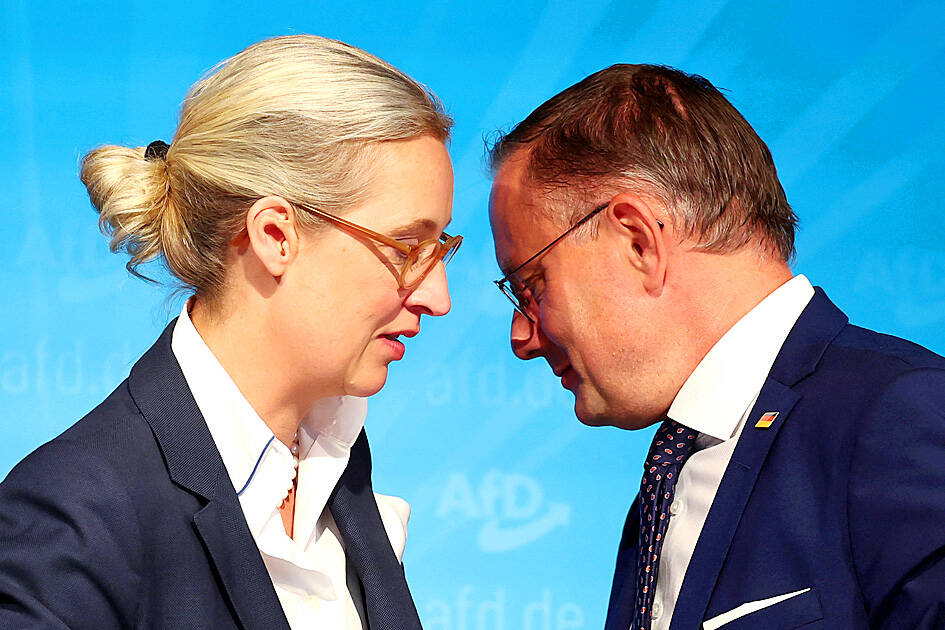German Chancellor Olaf Scholz yesterday urged parties to avoid collaborating with the far right, after the Alternative for Germany (AfD) made record gains in two regional polls and his own coalition suffered a heavy defeat a year before a general election.
In the former East German state of Thuringia, the anti-immigrant, anti-Islam AfD became the first far-right party to win a regional election since World War II, taking about 33 percent of the vote on Sunday. The AfD was headed for a close second place in Saxony.
The Bild daily described the outcome as “a political earthquake.”

Photo: Reuters
Scholz, whose deeply unpopular three-party coalition received a slapdown in both states, called the results “bitter” and “worrying.”
“The AfD is damaging Germany. It is weakening the economy, dividing society and ruining our country’s reputation,” he said.
“All democratic parties are now called upon to form stable governments without right-wing extremists,” he said in a message on Facebook.
Coalition governments are the norm in Germany at federal and state level, and mainstream parties have always ruled out collaboration with the far right.
However, AfD coleader Alice Weidel said she believed the “undemocratic firewall” was untenable given the party’s electoral success, while fellow leader, Tino Chrupalla, said that there would be “no politics without the AfD.”
The conservative Christian Democratic Union (CDU), the only centrist party to perform strongly on Sunday, was quick to dismiss the idea of teaming up with the AfD.
“Voters know that we do not form coalitions with the AfD,” CDU General Secretary Carsten Linnemann said.
The CDU only narrowly edged out the AfD with 32 percent of the vote in Saxony, and came second in Thuringia.
The conservatives still hold hopes of leading the next government in Thuringia, with their lead candidate, Mario Voigt, appealing for a “reasonable government” in a coalition led by the CDU.
The AfD’s controversial local leader, Bjoern Hoecke, said that his party was the “people’s party in Thuringia.”
“We need change and change will only come with the AfD,” he said, hailing the “historic result.”
Hoecke has often caused outrage with his outspoken statements and was fined twice this year for deliberately using a banned Nazi slogan.
Sahra Wagenknecht, who heads the far-left BSW, said her party “cannot work together” with Hoecke and has long ruled out a coalition with the AfD.
BSW, formed earlier this year as a breakaway from the ex-communist Linke party, secured vote shares in the teens in both regional polls and is seen as a key building block in any coalition.

The CIA has a message for Chinese government officials worried about their place in Chinese President Xi Jinping’s (習近平) government: Come work with us. The agency released two Mandarin-language videos on social media on Thursday inviting disgruntled officials to contact the CIA. The recruitment videos posted on YouTube and X racked up more than 5 million views combined in their first day. The outreach comes as CIA Director John Ratcliffe has vowed to boost the agency’s use of intelligence from human sources and its focus on China, which has recently targeted US officials with its own espionage operations. The videos are “aimed at

STEADFAST FRIEND: The bills encourage increased Taiwan-US engagement and address China’s distortion of UN Resolution 2758 to isolate Taiwan internationally The Presidential Office yesterday thanked the US House of Representatives for unanimously passing two Taiwan-related bills highlighting its solid support for Taiwan’s democracy and global participation, and for deepening bilateral relations. One of the bills, the Taiwan Assurance Implementation Act, requires the US Department of State to periodically review its guidelines for engagement with Taiwan, and report to the US Congress on the guidelines and plans to lift self-imposed limitations on US-Taiwan engagement. The other bill is the Taiwan International Solidarity Act, which clarifies that UN Resolution 2758 does not address the issue of the representation of Taiwan or its people in

US Indo-Pacific Commander Admiral Samuel Paparo on Friday expressed concern over the rate at which China is diversifying its military exercises, the Financial Times (FT) reported on Saturday. “The rates of change on the depth and breadth of their exercises is the one non-linear effect that I’ve seen in the last year that wakes me up at night or keeps me up at night,” Paparo was quoted by FT as saying while attending the annual Sedona Forum at the McCain Institute in Arizona. Paparo also expressed concern over the speed with which China was expanding its military. While the US

SHIFT: Taiwan’s better-than-expected first-quarter GDP and signs of weakness in the US have driven global capital back to emerging markets, the central bank head said The central bank yesterday blamed market speculation for the steep rise in the local currency, and urged exporters and financial institutions to stay calm and stop panic sell-offs to avoid hurting their own profitability. The nation’s top monetary policymaker said that it would step in, if necessary, to maintain order and stability in the foreign exchange market. The remarks came as the NT dollar yesterday closed up NT$0.919 to NT$30.145 against the US dollar in Taipei trading, after rising as high as NT$29.59 in intraday trading. The local currency has surged 5.85 percent against the greenback over the past two sessions, central